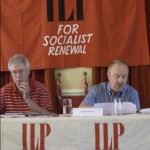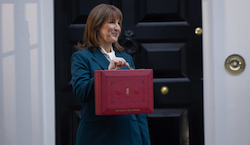“There is a sense of uncertainty and flux, a feeling that we’re coming to the end of an era in politics. It’s one that we’ve never much liked, yet we know what’s coming could be so much worse.”
With those unsettling words David Connolly, chair of Independent Labour Publications, opened the ILP’s weekend seminar in Scarborough on 13 June, just a week after right wing parties – centre and far – had celebrated election gains across the country and the continent at the expense of the left.
Called ‘Crunch Times: Politics and the Crisis’, the round table discussions drew ILP members and friends to the east coast to try and make sense of the turbulent world we are living in.
There was, as Connolly identified, “a strong sense of foreboding about the future”. For while some on the left have hailed the credit crunch as the end of neoliberalism and an opportunity for progress, the recent council and European election results have revealed “an eerie quality to politics”.
Yet, there was also a clear desire among those gathered at the Esplanade Hotel to gain some understanding of the political and economic crises of the last two years; to put them in the context of the last three neoliberal decades; to grasp the likely social and political consequences of the turmoil; and to begin to chart a possible course towards a renewed politics of the left.
Will Brown began by outlining the genesis of the recent financial collapse, placing it in the context of other market crashes that have occurred over the last two decades. He contrasted the dominant view of markets – that they are efficient and accurate reflections of value – with the Keynesian notion that financial markets are inherently unstable, with periods of boom and bust “hard-wired into the system”.
He traced the recent crisis, from the US property boom through rising interest rates to bankruptcy among sub-prime mortgage lenders and the 2008 credit crunch at US and European banks. He stressed its origins in the political decisions made by western governments over the last 30 years, from the Thatcherite deregulation of the financial system to new Labour’s hands-off approach.
“Anyone who tries to make out that the financial system is, or can be, run outside of political influence, or that financial policy is in any sense a technical or depoliticised arena, is deluding themselves,” he said.
“It’s political pressure that dictates banks can’t go bust; or that economies should always grow; or that declines in wage levels can be offset by credit booms; or that depositors’ money should be protected. And it is politics that dictates the kind of regulatory aims we set.
“The architecture of the financial system, and the choices governments make about regulation, are more important than the somewhat hysterical blaming of individual bankers: you wouldn’t absolve them of blame but nor would you absolve policy makers for their choices, nor indeed individual borrowers for their unwise borrowing.”
Barry Winter also pointed to the “perilous conceit that lies behind the current crisis”, and marked the hubris of governments and financial managers who had allowed themselves to believe, in the words of one Bush adviser, that they could “create their own reality”.
The foundations of the free market economic boom lay in the defeat of the Labour movement and the abolition of capital controls by Reagan and Thatcher, he said. Beneath the bubble lay the “the real story” – “the utter destruction of the wealth and wages of those at the bottom. This is why people turned to credit.”
But we are not free of blame either, said Winter, for the system had each of us in its sights too. “We’ve been bombarded with this thinking for 30 years.” Why save, if you can get it on credit? Why use a building society, if you can make money from your money? Houses aren’t homes but investments, we were told. “We’ve been encouraged to live in the here and now, as if there are no consequences: buy now, pay later.”
While neoliberalism has weakened democracy at home, the so-called “longest boom in history”, based on vast quantities of cheap goods from Asia and a credit-fuelled consumerist culture, has hurt people elsewhere in the world even more than in the west.
“We are part of the problem as well as part of the solution,” he said. “But now we are presented with significant opportunities and challenges. The question we face is can we build an alliance of people who seek a moral dimension to politics and to our lives?”
In the second session, delegates discussed the economic, social, environmental and political consequences of the crisis and the period of liberalised capitalist boom that preceded it. People talked of their own discontent and political disengagement as new Labour bought the free market myth; and they revealed their fears about what’s to come now the myth’s exploded – a Tory government, the BNP, the end of the Labour Party as we know it?
“The crisis is not over,” warned Sarah Bracking. “There is a herd of elephants approaching in the form of huge cuts. We have to decide what we think about that: do we accept a lower standard of living, or shift the burden from the working class to the wealthy?”
 On day two, the debate shifted to what all this means for the Labour Party, the left and the prospects for progressive social change. Andy Hansford opened the session by critically examining the analyses and proposals of John Cruddas and Jonathan Rutherford in The Crash, and David Purdy in Feelbad Britain (details from Soundings).
On day two, the debate shifted to what all this means for the Labour Party, the left and the prospects for progressive social change. Andy Hansford opened the session by critically examining the analyses and proposals of John Cruddas and Jonathan Rutherford in The Crash, and David Purdy in Feelbad Britain (details from Soundings).
Cruddas and Rutherford argue that we are at an “epochal moment” with the UK on the edge of an abyss. There is no way back to market fundamentalism, they say, the left’s “time has come” to create the “good society”. They present a series of demands, from a citizens’ income to bank regulation to proportional representation and an elected House of Lords.
But while they still see some hope in the Labour Party as a means to meet such requests, there’s no discussion of the obstacles such a programme might encounter. Purdy, on the other hand, argues that Labour can no longer be regarded a force for socialism and calls for a realignment of left forces outside of and separate from the Labour Party.
Hansford was not alone in suggesting both arguments are not entirely convincing. The left needs a broader perspective and a vision of the way forward, but it needs to start engaging too, and the Labour Party, for all its many faults, still provides the primary social democratic vehicle for progressive hopes and possibilities. The notion that we can somehow sidestep the Labour Party has been tried and failed numerous times over the last 30 years.
Indeed, if Labour is destroyed – electorally, financially, organisationally – it will be a disaster, “a tragedy”, as one delegate put it. “Let’s not forget the good that this Labour government has done,” said Ernie Jacques. “Some of the poorest people have never been better off than they are now because of Labour’s policies.”
Chris Wilson agreed: “Labour is problematic but at the moment it commands the vast majority of progressive votes in this country. It should still be the focus for our politics.”
For Eric Preston the onus is on Labour to reform and democratise. “The Labour Party will only survive and only deserve to if it properly becomes a party,” he argued. “At the moment it is a parliamentary party only.” We need to work out what demands we should make so it becomes “the kind of organisation we want it to be”.
Overall, despite the opening sense of uncertainty and gloom, the mood at the end of the weekend was best reflected by delegates from the north east, Kath Connolly and Mary Stratford, who insisted: “We can’t sit back and do nothing when we see the situation we’re in now. We need to do the thinking, we need the vision, but we need to start engaging too.”
—-
To read Barry Winter’s analysis of neoliberalism and its impact, click here.
Will Brown’s analysis of the financial crisis as a wasted opportunity is here.



16 November 2009
[…] Times: Politics and the Crisis. To read a report of that event and link to other contributions click here. To read other articles on the economic crisis, click here. Tags: Economics, Financial crisis, […]
25 June 2009
[…] These issues, and more, were discussed at the ILP’s round table seminar – Crunch Times: Politics and the Crisis – on 13/14 June 2009. You can read reports and articles from the weekend here. […]